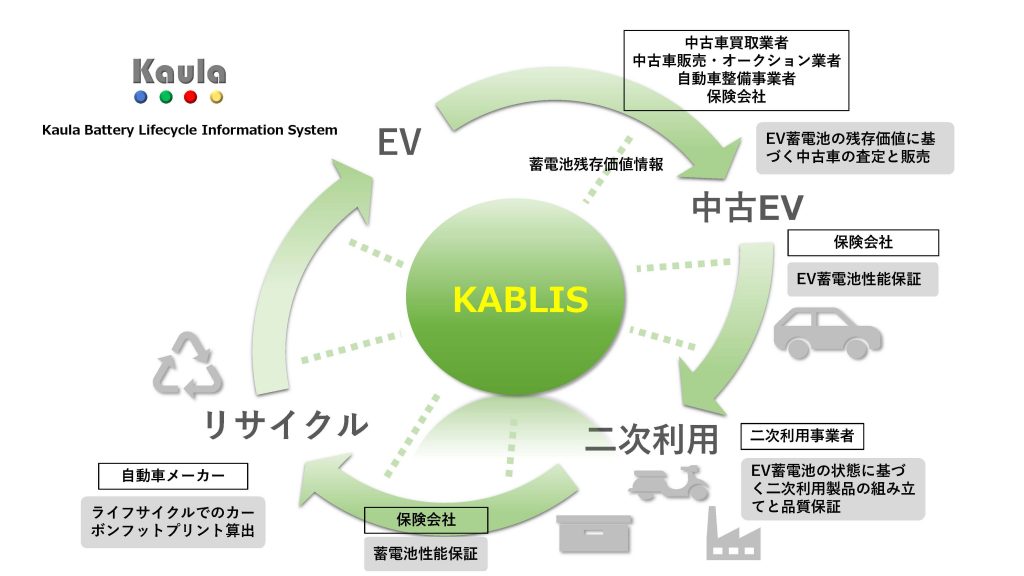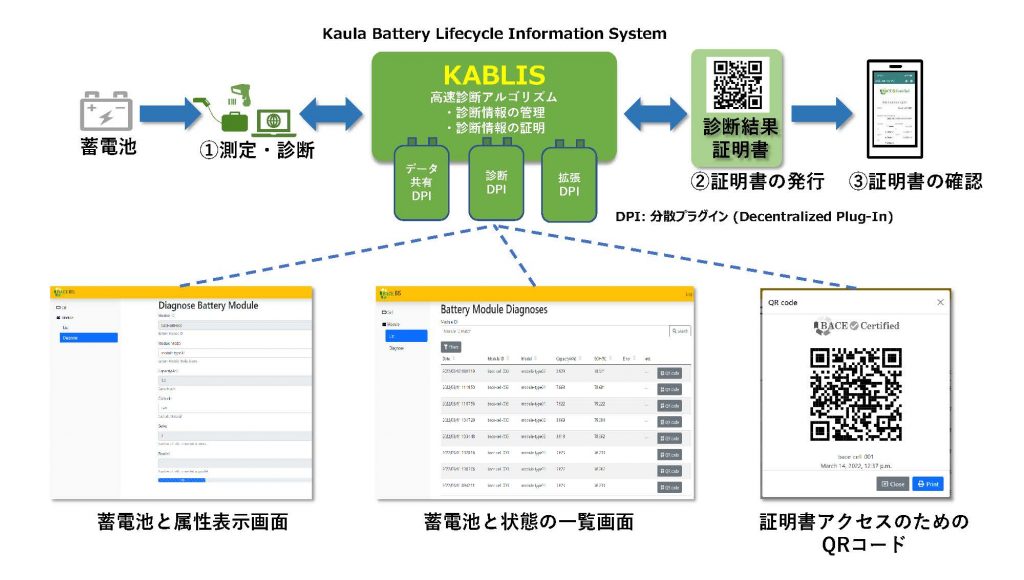~ Aiming to start a business within the fiscal year to promote the formation of a circular economy with energy storage batteries ~
Kaula, Inc. (Head Office: Minato-ku, Tokyo; Representative Director: Katsuji Okamoto; thereafter “Kaula”) joined BACE Consortium (*1) and MOBI (*2), and has engaged in the technical verification of a platform for managing information regarding energy storage batteries that are expected to continue to see greater use. The platform conducts technical diagnosis on various types of batteries and manages the lifecycle information of batteries with blockchain technology and Web3.0 technology such as DID/SSI. We are aiming to launch this platform, KABLIS (KAula Battery Lifecycle Information System), within FY2022.
■Changes in the Surrounding Environment
The re-circulation of energy storage batteries used in electric vehicles (EVs) and in the residential and commercial sectors is expected to be a significant factor necessary for the green growth strategy as formulated by the Ministry of Economy, Trade and Industry in 2020. Re-circulating energy storage batteries is expected to be carried out in a multilayered manner, such as by first being used as a power adjuster for renewables and other such wide-ranging applications for reuse, and further by recycling the resources for reuse.
However, the recycling market for rechargeable batteries has not been established, and reuse itself is conducted efficiently. It is necessary to have a mechanism for measuring and evaluating the residual value of used energy storage batteries. In addition, it will be necessary to have a platform that allows the compatibility for using the information about energy storage batteries in order to promote circular use across industries.
In Europe, the Battery Directive already promotes the recycling and maximum efficiency of energy storage battery use across industries, and there is a movement to accelerate standardization and rulemaking for the world. Kaula aims for the formation of an ecosystem related to the lifecycle management of energy storage batteries, and announces its intention for conducting technical demonstrations of the platform “KABLIS” and its commercialization .
■Kaula’s Vision for the Business

Based on technological demonstrations, Kaula will provide the platform that can be used by a variety of businesses involved in the use of energy storage batteries, verification of the existence of data using block chain technology, and the provision of applications, in response to the service needs demanded by the industry. In FY2022, Kaula will launch the KABLIS platform and expand it globally.
■Technology Demonstration and Commercialization of the Platform
As the first stage, in collaboration with the BACE Consortium, Kaula will measure and collect data on a wide variety of energy storage batteries in order to conduct residual value diagnostics for EV automotive batteries. From these, Kaula evaluates the value of energy storage batteries and manage information, and develop technologies and conduct demonstration experiments for our platform that provides verification of existence and diagnosis.
Based on the results of the experiments, Kaula can verify that energy storage battery data measured in a short period of time can be widely used through the platform to new reuse businesses, and Kaula will develop an ecosystem by providing data services to various businesses in the industry.

■ Statement from our Partner Company
Hideki Kidoshi, Senior Specialist, Emergent Strategy Center, Japan Research Institute, Inc.
We welcome Kaula’s announcement of the “Commercialization of KABLIS, the Circular Economy’s Battery Platform.” In order to form a market for re-circulating EV batteries that maximizes the added value of EVs, which will continue to expand, it is essential to have a platform that promotes information collaboration by utilizing blockchains. Building commercially available platforms is an advanced initiative in the world as well, and will contribute significantly to the early formation of the market. We hope that BACE Consortium that we sponsor will use this technology to contribute to the creation of new markets.
(※1) BACE consortium (Battery Circular Ecosystem consortium)
The consortium was established in October 2020 by the Japan Research Institute, Inc., to develop advanced diagnostic technologies in Japan and to study business by companies that form an ecosystem in the circular economy. Using a large number of advanced diagnostic technologies, we aim to build an ecosystem in a circular economy centered on unprecedented diagnostic functions. Through these efforts, we will (1) improve the resale value by clarifying the quality of EVs at the time of the sales transaction; (2) expand the market for reused batteries by improving quality during reuse and increasing reliability; (3) build a shared foundation and improve reliability of battery distribution information by persons involved in the dispersed value chain, such as used sales, maintenance, demolition, and reuse; and (4) realize a platform for diagnosis and battery value distribution that creates a cross-industry service business that improves the decarbonization value of batteries by calculating CO2 emissions and CO2 reduction benefits of batteries.
- Established a consortium on a model for recycling in-vehicle batteries (October 16, 2020)
https://www.jri.co.jp/company/release/2020/1016-1/
- Testing of EV Battery Residual Value Diagnostic Technology (July 15, 2021)
https://www.jri.co.jp/company/release/2021/0715/
- Agreement concluded on March 31, 2022 to commercialize residual value assessment services for EV batteries
https://www.jri.co.jp/company/release/2022/0331/
(※2)MOBI (Mobility Open Blockchain Initiative)
A not-for-profit consortium comprising about 120 organizations worldwide. Member companies include automobile manufacturers, insurance companies, local governments, and start-up companies. There are eight members of Japanese companies. Drafts standards for automobiles and related businesses using block chain technology and to build digital infrastructure.